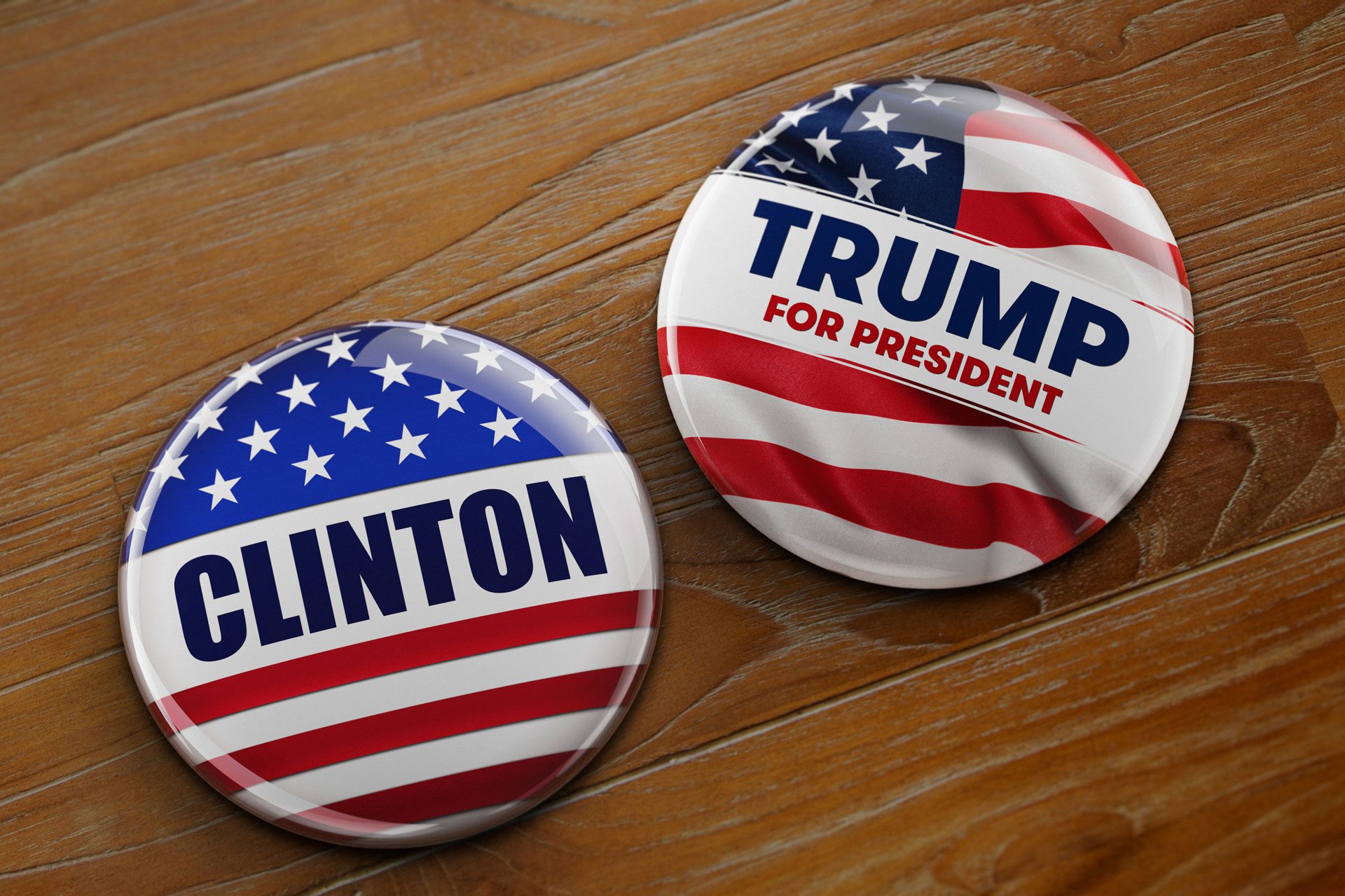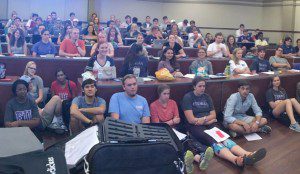Professor Inabinet Discusses Who Won and Who Lost Debate

On Monday night, Hillary Clinton and Donald Trump squared off in what may have been the most anticipated American presidential debate in history. Dr. Brandon Inabinet, an associate professor of Communication Studies at Furman, moderated a Debate Watch on campus with approximately 100 students in attendance. We asked him how Clinton and Trump fared in the debate and what the students thought of the candidates’ performances.
Q: You polled the students following the debate. Who did they think won?

Dr. Brandon Inabinet
Inabinet: Secretary Clinton won fairly substantially and even added some voters. We use remote polling devices, and with students packing the classroom, the questions I asked regarding the debate results went drastically in her favor.
The debate had more subtle results on the anticipated voting booth behavior—we went from 27 for Trump and 27 Clinton (with 13 for the other candidates), to 24 Trump and 32 Clinton (with 9 for the other candidates). So if students went to the voting booth on September 27, Secretary Clinton would likely have taken the lead, even though she was initially even with Mr. Trump before the debate began, both in our room and in the national polls.
Q: Why do you think Hillary Clinton fared well in the debate for these students?
Inabinet: She managed her time well and the students noted this. Most ordinary citizens are not used to the sounds of democracy, unlike debate teachers like me! When Americans, oversaturated with information, turn on the television and see shouting or street protests, they would prefer clarity of roles and order—polite and quiet, without resistance or argumentation. So, with that need in mind, Secretary Clinton managed to pace herself well, especially on questions of race, by slowing her pace when she was allotted time, using the time given without going over, and yielding to the moderator, Lester Holt.
In terms of tone, she had to avoid sounding “shrill” or “fussy,” which are traits voters (male and female) especially judge in women, while at the same time holding her argumentative ground. Through clear preparation, including cases, examples, and coded labels of Trump’s proposals, she ran a good counterargument.
Q: How about Donald Trump? Even if the students thought he “lost,” did he excel in any particular area?
Inabinet: Let’s start with the negatives. He appeared nasty and less respectful, in students’ view. In the first few seconds, his louder breathing and his pushiness toward Clinton in asking if it was “OK” to call her “Secretary Clinton” all seemed like he was dismissive. His use of different wording (like “Law & Order” instead of “Law”) and question redirection (such as answering with his slogan, “Make America Great Again”) seemed reductive to students.

Approximately 100 Furman students attended the Debate Watch Monday night.
He excelled in the use of rhetorical devices that were classic to him and enjoyable for the students. If a person is unaware of their rhetorical artistry, these devices can be very effective, especially since his airtime has made them part of our everyday media consumption. So, for example, the major one he uses is paralepsis. It involves “I’m not saying X,” while actually very clearly making that point. He said many times he “wasn’t bragging” about his business successes, but touted his business successes for much of the debate, including his inclusive clubs that allow African-Americans and Muslims to patronize, his beautiful hotels that were quickly established, his profits, and his ability to avoid paying taxes. He similarly said he “wasn’t complaining,” about his audits, but by repeating the issue several times, was doing that very thing simultaneously.
Q: In terms of communication strategy, how would you advise the two going forward?
Inabinet: Clinton’s commercials are still having to do some rhetorical work her voice hasn’t grown into completely. In future debates and speeches, she will need to find higher emotional and moral valences. Most of her best moments were the zingers and shocked or giddy reactions to Mr. Trump’s “crazy” claims, “Trumped Up Trickle Down,” and his lack of preparation and “cavalier attitude.” If she wants to attract moderates, she needs to elevate a concern for “law” to one of “justice.” Instead of just being “tough” on enemies and “working closely” with allies in foreign policy, she needs to remind us of a global “American extended family” worth protecting, for example. When Mr. Trump calls for returning to “stop and frisk,” ending “world policing” of enemies, or leaving “losing deals” with allies, she would have given us a better frame under which to consider them, rather than needing direct counterargument strategies to each point. I imagine this will come in future debates.

Dr. Inabinet moderated the Debate Watch Monday night.
Mr. Trump is a novelty act still, so I have less advice there. As with my friends in Political Science, we are having a hard time explaining the phenomenon, except with some reference to populism and demagoguery. Unlike most politicians who are very self-policing and corrective, as Secretary Clinton clearly is from a lifetime in politics, Mr. Trump will use the same diction for which he was earlier mocked without worry. Mexico and China were loudly pronounced in the first few sentences of his presentation. Things were “huge.” If most of us used the word “bigly,” we’d note its awkwardness in our mouths and try to adjust. Mr. Trump is able to repeat it, alongside many other devices of amplification and repetition (“beautiful,” “biggest,” “greatest”), without flinching. So I think much of his success, of “telling it like it is,” is often less about content, and more about this high-style tropes and figures in low—even coarse—speaking style. It’s a kind of “truth telling” for our age, in which the actual truth is readily available through fact-finding and information at our fingertips, so politicians are tasked with exceeding those facts “authentically” (ironically), in the same way students might “literally die every time he talks.”
Even if I were to coach Mr. Trump, I’m not sure he would change! And that probably will work well for him—well enough that the political establishment and the party system will be rocked off-center whether he wins or not.
Q: Do you think the debate will have a significant impact on the presidential race during the final six weeks of the campaign?
Inabinet: Yes, but of course just as much for what the late night shows and Saturday Night Live make of them as any substantive content. Look, it makes me cringe to call these “debates.” I need to hear them take “pro” and “con” positions on agreed-upon resolutions. I need them to cite evidence from sources reluctant to their own positions. The 18 to 21 year-olds at Furman could astound you doing these things. Neither candidate “astounded” any of us Monday night. Yet in a tight election, the ammunition they give for punditry, social media memes, satire, and fact-checking will tilt the polls throughout October.
Q: Some estimates had the audience for the debate at 100 million people. Did they witness anything to make them feel positive about America’s political process?
Inabinet: Even though Secretary Clinton won the debate for all the reasons I’ve mentioned, it did normalize the “Trump phenomenon” just to see him in that same spot we’ve seen our Presidential candidates since the 1960s. When the camera first cut to him, students audibly laughed. They cannot believe older generations have selected him as a candidate for their first electoral vote: with his beauty pageants, casinos, and steaks; conspiracy theories about birth certificates and climate change. Similarly, when many students were pulling for Bernie Sanders until July, they now see the Democratic candidate chosen mostly for her clout and fundraising, while as Millennials, they believe that their ideas about changing the world should matter most.
Perhaps most horrifically, the final question of the debate was not for grand statements of principle or the genius of the American political experiment, but just whether the candidates would even abide by the results of an election. Grim.
Hope remains in local action. Furman students are creating a movement for the right to vote in Greenville County based on their Furman residence. When a student asked if he could pass out registration forms, the room quickly was electric in anticipation of making history to increase voter participation. They want to make a difference—but they believe the difference will likely not be the outcome of this election. For now, a functional political process is a dream deferred, perhaps a few votes down the line. After all, most of these students should be voting in a 2080 election, which will make this whole grueling affair look quaint.